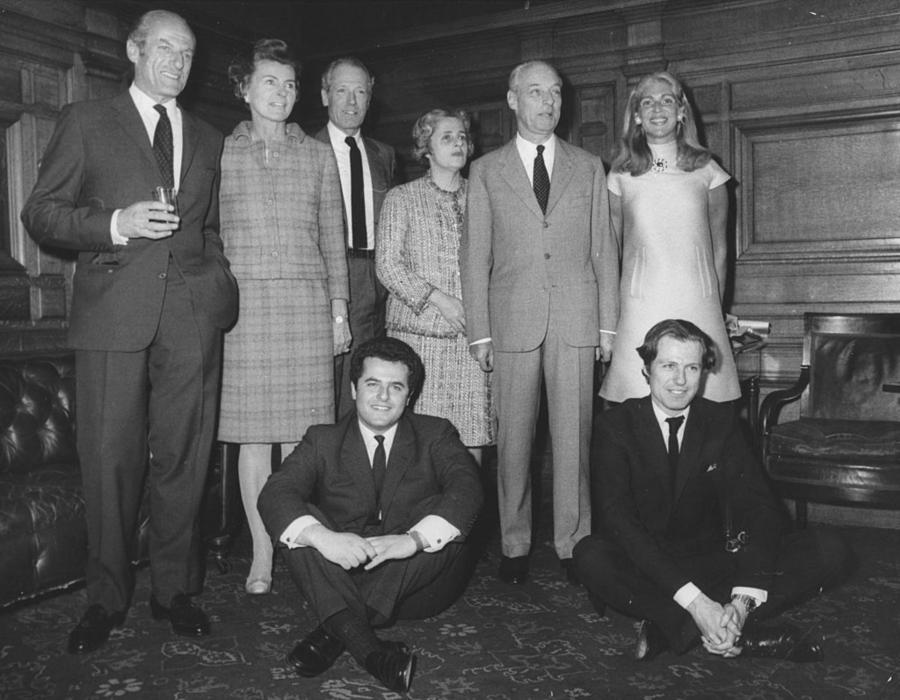The Rothschild Dynasty: A Legacy of Wealth, Power, and Influence
The Rothschild family, synonymous with wealth, power, and influence, has left an indelible mark on the landscape of global finance and politics for over two centuries. From humble beginnings in Frankfurt's Jewish ghetto to becoming one of the most influential banking dynasties in history, the Rothschilds have wielded their financial prowess to shape the course of nations and economies. This article delves into the fascinating history, achievements, controversies, and enduring legacy of the Rothschild family. Origins and Rise to Prominence
Origins and Rise to Prominence
The Rothschild saga began in the late 18th century with Mayer Amschel Rothschild, born in 1744 in Frankfurt, Germany. Mayer started his career as a dealer in rare coins and antiquities, leveraging his keen business acumen to establish a banking business. Despite facing discrimination as a Jew in a predominantly Christian society, Mayer persevered and laid the foundation for what would become a financial empire.
The turning point came with Mayer's five sons: Amschel, Salomon, Nathan, Carl, and James. Each son was sent to a different European financial center to establish branches of the family bank, thus creating an extensive network across Europe. This strategic move allowed the Rothschilds to capitalize on the fragmented nature of European finance and establish themselves as one of the continent's preeminent banking houses.
Expansion and Influence The Rothschild brothers' astute financial strategies and shrewd investments propelled their family to unprecedented wealth and power. They financed wars, facilitated international trade, and provided capital to governments and monarchs across Europe. Their ability to move money swiftly and discreetly across borders gave them a competitive edge in an era when financial transactions were slow and cumbersome.
The Rothschild brothers' astute financial strategies and shrewd investments propelled their family to unprecedented wealth and power. They financed wars, facilitated international trade, and provided capital to governments and monarchs across Europe. Their ability to move money swiftly and discreetly across borders gave them a competitive edge in an era when financial transactions were slow and cumbersome.
One of the Rothschilds' most notable achievements was their role in financing the British war effort against Napoleon. Nathan Rothschild, stationed in London, played a pivotal role in raising funds for the Duke of Wellington's campaign. His timely investments in British government bonds prior to the Battle of Waterloo earned him immense profits and solidified the Rothschilds' reputation as financial wizards.
Cultural and Philanthropic Contributions Beyond their financial exploits, the Rothschilds were also patrons of the arts, sciences, and philanthropy. They amassed vast art collections, supported cultural institutions, and funded scientific research. Baron Ferdinand de Rothschild, for instance, was a passionate collector of fine art and established the renowned Waddesdon Manor in Buckinghamshire, England, as a showcase for his treasures.
Beyond their financial exploits, the Rothschilds were also patrons of the arts, sciences, and philanthropy. They amassed vast art collections, supported cultural institutions, and funded scientific research. Baron Ferdinand de Rothschild, for instance, was a passionate collector of fine art and established the renowned Waddesdon Manor in Buckinghamshire, England, as a showcase for his treasures.
Moreover, the Rothschilds were committed to social causes and charitable endeavors. They supported educational initiatives, built hospitals, and contributed to the welfare of Jewish communities worldwide. Their philanthropy extended beyond their own religious community, encompassing various humanitarian causes and social reforms.
Controversies and Criticisms Despite their philanthropic efforts and contributions to society, the Rothschilds have not been immune to controversy and criticism. Throughout history, they have been the subject of various conspiracy theories, ranging from allegations of controlling world governments to accusations of orchestrating global financial crises for their benefit.
Despite their philanthropic efforts and contributions to society, the Rothschilds have not been immune to controversy and criticism. Throughout history, they have been the subject of various conspiracy theories, ranging from allegations of controlling world governments to accusations of orchestrating global financial crises for their benefit.
Much of this conspiracy mongering can be traced back to anti-Semitic prejudices and a deep-seated mistrust of wealthy elites. The Rothschilds' perceived secrecy, influence, and interconnectedness fueled speculation and fueled conspiracy theories, often with little basis in fact.
Additionally, the family's involvement in high finance and international affairs has occasionally drawn scrutiny and criticism. Critics argue that their immense wealth and influence give them undue power over political and economic systems, potentially undermining democratic principles and exacerbating social inequality.
Legacy and Contemporary Influence Despite the controversies surrounding their name, the Rothschilds' legacy endures as a testament to their unparalleled achievements in the realm of finance and philanthropy. Their banking dynasty, though no longer the dominant force it once was, continues to operate across the globe, albeit in a diminished capacity.
Despite the controversies surrounding their name, the Rothschilds' legacy endures as a testament to their unparalleled achievements in the realm of finance and philanthropy. Their banking dynasty, though no longer the dominant force it once was, continues to operate across the globe, albeit in a diminished capacity.
Moreover, the Rothschilds' impact extends beyond the realm of finance. Their contributions to art, culture, and philanthropy have left an indelible mark on the world, enriching society and enhancing the lives of countless individuals.
Challenges and Adaptations
As the world evolved, so did the challenges faced by the Rothschild family. The dawn of the 20th century brought seismic shifts in global politics and economics, including two world wars, the rise of communism, and the Great Depression. These turbulent times posed significant challenges to the Rothschilds' financial empire, forcing them to adapt to rapidly changing circumstances.
During the interwar period, the Rothschilds faced increasing scrutiny and hostility, particularly in Europe where anti-Semitic sentiment was on the rise. The rise of totalitarian regimes in Nazi Germany and fascist Italy posed a direct threat to the family's interests and safety. Many family members fled to safer havens, while others saw their assets confiscated by hostile governments.
Despite these challenges, the Rothschilds managed to navigate the tumultuous waters of the 20th century and preserve their legacy. They diversified their investments, expanded into new industries, and forged alliances with other powerful families and institutions. By maintaining their global network of contacts and adapting to changing market conditions, they ensured the survival of their banking dynasty into the modern era.
Modern Era and Decline of Influence In the post-World War II era, the Rothschilds continued to play a prominent role in global finance, but their influence began to wane. The emergence of new financial centers, such as New York and Hong Kong, challenged the traditional dominance of European banking houses. Moreover, the proliferation of multinational corporations and the advent of globalization changed the dynamics of the financial industry, making it more competitive and less reliant on traditional banking institutions.
In the post-World War II era, the Rothschilds continued to play a prominent role in global finance, but their influence began to wane. The emergence of new financial centers, such as New York and Hong Kong, challenged the traditional dominance of European banking houses. Moreover, the proliferation of multinational corporations and the advent of globalization changed the dynamics of the financial industry, making it more competitive and less reliant on traditional banking institutions.
Additionally, changing attitudes towards wealth and power led to increased scrutiny of the super-rich, including the Rothschilds. Calls for greater transparency, accountability, and social responsibility placed pressure on the family to adapt to evolving societal norms. While the Rothschilds remained wealthy and influential, they no longer occupied the commanding heights of global finance as they once did.
Despite their diminished influence, the Rothschilds' legacy endures as a symbol of entrepreneurship, innovation, and resilience. Their story serves as a reminder of the power of ambition, ingenuity, and perseverance in the face of adversity. Moreover, their philanthropic efforts continue to benefit society, funding charitable causes and supporting cultural institutions around the world.
In recent years, some members of the Rothschild family have sought to distance themselves from the limelight, preferring to lead more private lives away from the glare of public scrutiny. Others have continued to engage in business and philanthropy, carrying on the family's traditions and values into the 21st century. In conclusion, the Rothschild family's journey from obscurity to global prominence is a testament to the enduring power of wealth, influence, and ambition. Despite facing adversity, persecution, and criticism, they have persevered and left an indelible mark on the world. Whether viewed as financial titans, cultural patrons, or philanthropic leaders, the Rothschilds' legacy will continue to fascinate and inspire future generations for years to come.
In conclusion, the Rothschild family's journey from obscurity to global prominence is a testament to the enduring power of wealth, influence, and ambition. Despite facing adversity, persecution, and criticism, they have persevered and left an indelible mark on the world. Whether viewed as financial titans, cultural patrons, or philanthropic leaders, the Rothschilds' legacy will continue to fascinate and inspire future generations for years to come.















































![[FAILED] Engage2Earn: Shayne is helping koalas!](https://cdn.bulbapp.io/frontend/images/08e2e573-f490-4ef4-93b6-f2285814da59/1)












